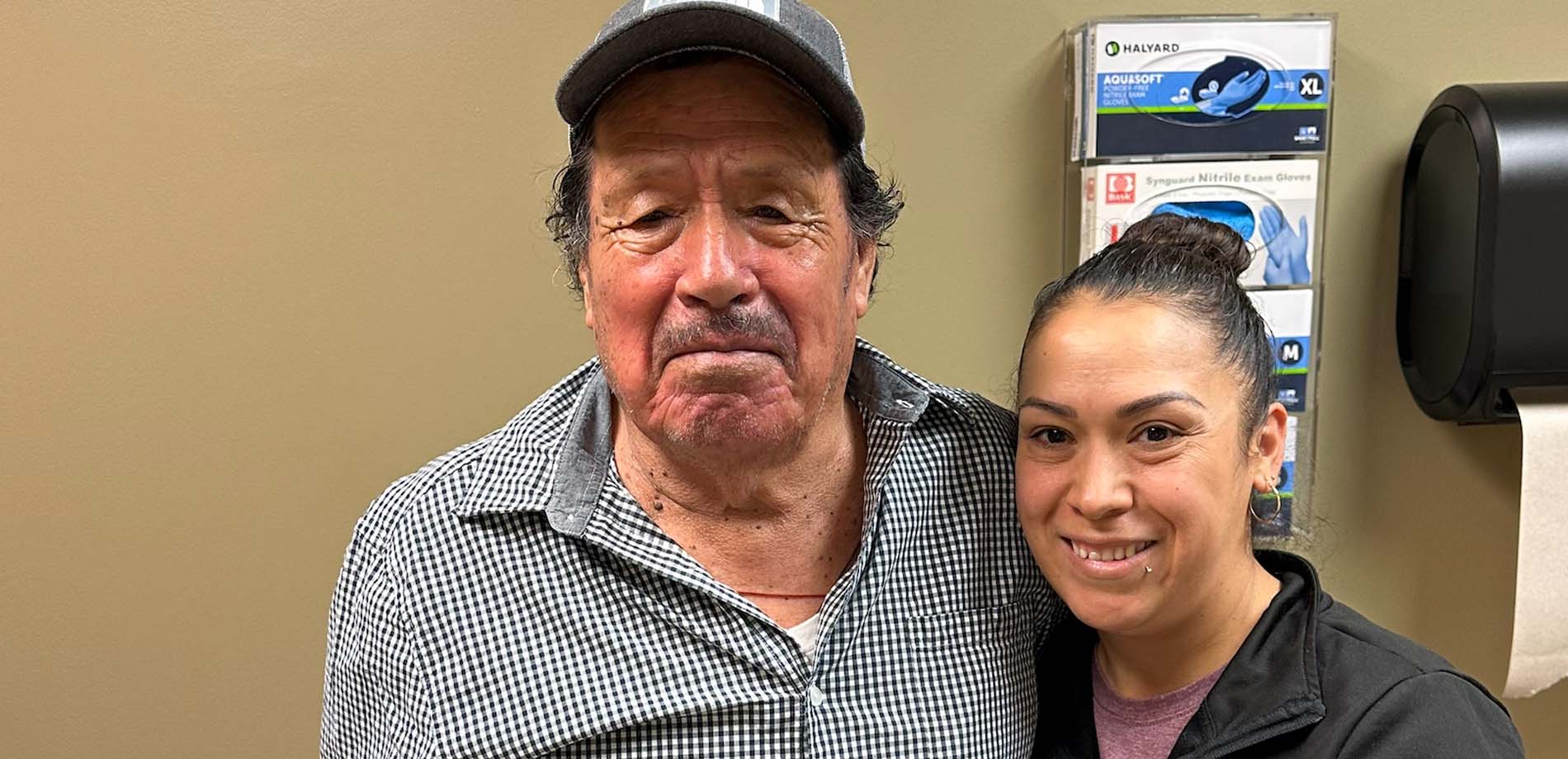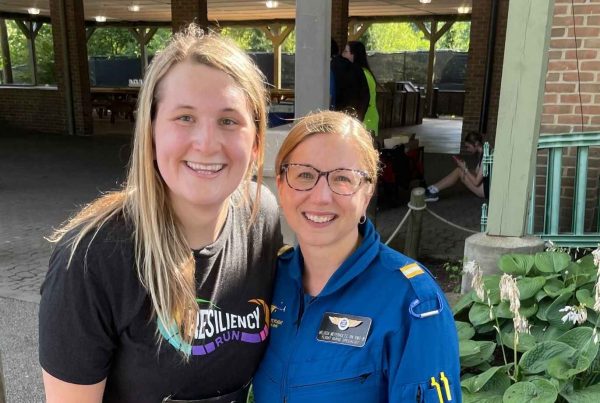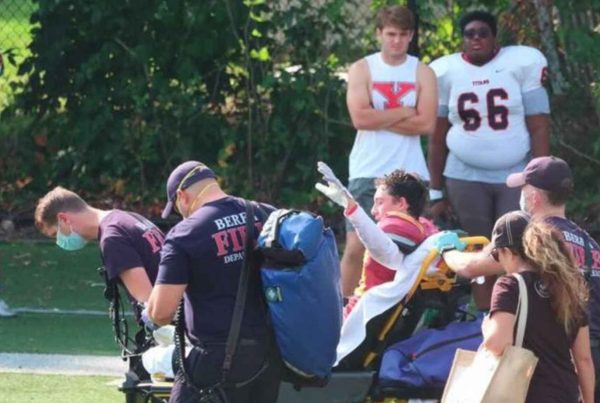“We are so very grateful to Metro and all the staff. This was a difficult journey indeed — but a beautiful story at the same time because my father is doing so well. We are so grateful for you all.”
Raymundo Mora was a farmer in Guanajuato, Mexico, harvesting corn and beans, before he came to visit his daughter Leonor in Cleveland in September 2020. Leonor had settled in Cleveland more than a decade earlier. It wasn’t Raymundo’s first visit; he would typically stay a couple of months, then go back to Mexico to attend to his farm and livestock.
This time was different. He had planned to have hernia surgery in February 2021 before recuperating and going back home.
The hernia surgery never happened; Leonor brought Raymundo to the hospital that same month because he could barely breathe and he was swollen all over, especially his feet.
It turned out that he had heart failure and severe aortic stenosis – his aortic valve had thickened so much that blood couldn’t flow through it to get to the rest of his body.
Because Raymundo didn’t have adequate insurance to cover any additional treatment beyond diagnostic tests, the hospital discharged him.
Four weeks later, Leonor took Raymundo to MetroHealth. Immediately, the cardiology team began working with social work and patient assistance.
“We got approval and put a plan in place for him to get a life-saving valve replacement procedure,” said James Ramson, APRN-CNP in Cardiology.
Doctors told Raymundo and his family that transcatheter aortic valve replacement (TAVR) was his only option for survival.
TAVR is an alternative to open heart surgery. During the minimally invasive procedure, surgeons insert a catheter in the groin and guide it to the heart. A replacement valve is passed through the catheter. A balloon on the catheter top inflates and secures the valve in place.
In 2020, following changes in guidelines that expanded the recommended patient population, MetroHealth began offering TAVR.
“Over the years, with improved technology and the success of multiple clinical trials, TAVR results have shown to be pretty much equal to open heart surgery,” says interventional cardiologist Meera Kondapaneni, MD. “A lot of patients say that they’d rather have TAVR. People come asking for this now.”
Ninety percent of patients are discharged from the hospital within 24 hours of having the procedure.
“Usually if the patient is over 70, the gold standard is TAVR,” Ramson said. Raymundo was 76. “Mr. Mora was not even a surgical candidate.”
“We were so worried,” Leonor said. “We prayed a lot and decided to move forward with the procedure.”
Added Raymundo: “When I decided to have the surgery, I was not afraid—I had faith in God and in my daughters—they knew what was best for me.”
Doctors stabilized Raymundo and sent him home. He would return in four weeks for the TAVR procedure.
During that time, he contracted COVID-19 and was in the hospital for more than two weeks.
On April 7, 2021, the first time Raymundo returned for TAVR, he went into cardiac arrest while being sedated.
Cardiologists Khalil Murad, MD, and Najmul I. Siddiqi, MD gave him medicine intravenously to remove the fluid around his heart and help the heart pump. They also inserted a catheter to help measure fluid levels and pressures in the heart. Then they had a frank discussion with Raymundo’s family.
If they went ahead with the TAVR there would be a decent chance that he’d survive.
If they chose not to do anything, there would be a 100% chance that he wouldn’t.
Once again, the family chose TAVR. Raymundo was sent home.
Over the next six weeks, Leonor and Beatrice, Raymundo’s other daughter, helped to change his diet. More fish and chicken, no salt, no red meats, lots of vegetables. They also oversaw the many medications he needed to take and kept him on oxygen.
Raymundo returned to MetroHealth on May 17. On May 19 – his 77th birthday – Dr. Kondapaneni and cardiothoracic surgeon Rami Akhrass, MD, performed the TAVR procedure, which took just under an hour.
Because of how critically ill he was prior to the TAVR procedure, Raymundo spent three days in the hospital under close observation before going home. He had follow-up appointments after one week, one month, three months, and one year.
At his one-year follow-up in May 2022, Raymundo was doing so well – no shortness of breath, no swelling, no longer on oxygen, being able to walk a little further each day – that his doctors cleared him to travel to Texas to visit a sick relative.
“If it wasn’t for Mr. Mora’s daughters, he wouldn’t be here, Ramson said. “If wasn’t for MetroHealth, he wouldn’t be here. We care for everybody, regardless of your financial status or if you’re from here.”
TAVR is typically a more expensive procedure than open heart surgery, says Dr. Kondapaneni. That MetroHealth’s financial counselors got the procedure approved for Raymundo underscores the hospital system’s mission at work, she says. “I’m proud of what we do here.”
As for Raymundo and his family, they are amazed and thankful for his recovery. His most recent follow-up appointment was in August 2024.
“We are so very grateful to Metro and all the staff,” Beatrice says. “This was a difficult journey indeed — but a beautiful story at the same time because my father is doing so well. We are so grateful for you all.”
MetroHealth Heart & Vascular Center
Our team is also committed to state-of-the-art research that could help prevent or treat cardiovascular disease.
Appointments: 216-778-2328 (BEAT) Pediatric Appointments: 216-778-2222.
Do you want to help patients like Raymundo? The MetroHealth Foundation is making a difference every day. Learn more or give at metrohealth.org/foundation.











